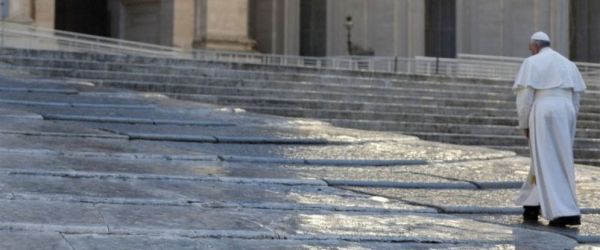Today Advent begins, the liturgical time which prepares us for Christmas, inviting us to lift our gaze and open our hearts to welcome Jesus. During Advent we do not just live in anticipation of Christmas; we are also called to rekindle the anticipation of the glorious return of Christ — when he will return at the end of time — preparing ourselves, with consistent and courageous choices, for the final encounter with him. We remember Christmas, we await the glorious return of Christ, and also our personal encounter: the day in which the Lord will call.
During these four weeks we are called to leave behind a resigned and routine way of life and to go forth, nourishing hope, nourishing dreams for a new future. This Sunday’s Gospel (cf. Lk 21:25-28, 34-36) goes in this very direction and puts us on guard against allowing ourselves to be oppressed by an egocentric lifestyle or by the phrenetic pace of our days. Jesus’ words resonate in a particularly incisive way: “take heed to yourselves lest your hearts be weighed down with dissipation and drunkenness and cares of this life, and that day come upon you suddenly ... But watch at all times, praying” (vv. 34, 36).
To be mindful and to pray: this is how to live the time between now and Christmas. To be mindful and to pray. Inner listlessness comes from always turning around ourselves and being blocked by our own life, with its problems, its joy, and suffering, but always turning around ourselves. And this is wearying; this is dull, this closes us off to hope. Here lies the root of the lethargy and laziness that the Gospel speaks about. Advent invites us to a commitment to vigilance, looking beyond ourselves, expanding our mind and heart in order to open ourselves up to the needs of people, of brothers and sisters, and to the desire for a new world. It is the desire of many people tormented by hunger, by injustice and by war. It is the desire of the poor, the weak, the abandoned. This is a favourable time to open our hearts, to ask ourselves concrete questions about how and for whom we expend our lives.
The second attitude to best experience the time of awaiting the Lord is that of prayer. Arise, “look up and raise your heads, because your redemption is drawing near” (v. 28), the Gospel of Luke cautions. It is about standing up and praying, turning our thoughts and our hearts to Jesus who is about to come. One stands when awaiting something or someone. We await Jesus and we wish to await him in prayer which is closely linked to vigilance. Praying, awaiting Jesus, opening oneself to others, being mindful, not withdrawn in ourselves. But if we think of Christmas in the light of consumerism, of seeing what I can buy in order to do this and that, of a worldly celebration, Jesus will pass by and we will not find him. We await Jesus and we wish to await him in prayer which is closely linked to vigilance.
But what is the horizon of our prayerful anticipation? In the Bible the voices of the prophets are especially revealing to us. Today it is that of Jeremiah who speaks to the people who had been harshly tried by exile and who risked losing their very identity. We Christians too, who are also the People of God, run the risk of becoming worldly and of losing our identity, indeed of ‘paganizing’ the Christian way. Therefore, we need the Word of God through which the prophet proclaims: “Behold, the days are coming, says the Lord, when I will fulfil the promise I made ... I will cause a righteous Branch to spring forth for David; and he shall execute justice and righteousness in the land” (Jer 33:14-15). And that righteous branch is Jesus. It is Jesus who comes and whom we await. May the Virgin Mary, who leads us to Jesus, a woman of expectation and prayer, help us to strengthen our hope in the promises of her Son Jesus, in order to enable us to understand that through the travail of history, God always remains steadfast and uses human errors, too, to manifest his mercy.
[Pope Francis, Angelus, 2 December 2018]












